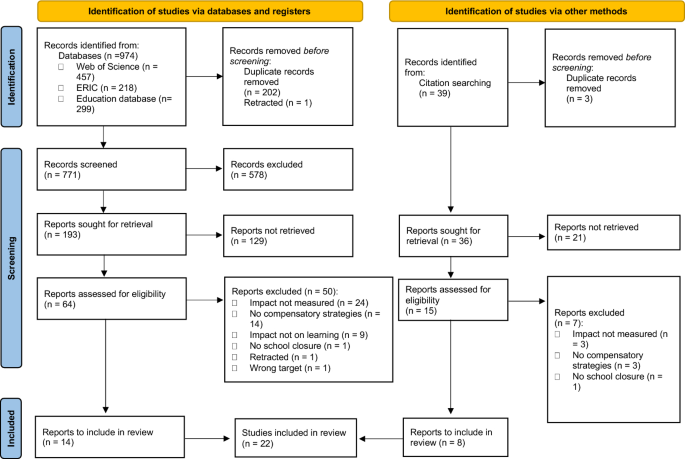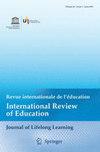COVID-19学校关闭期间家长和教师的补偿策略:范围审查
IF 1.6
Q1 EDUCATION & EDUCATIONAL RESEARCH
引用次数: 0
摘要
新冠肺炎疫情爆发后,大多数国家决定在2020年关闭学校,以减缓病毒的传播。学校的突然关闭要求教师和家庭迅速适应学校活动的在线环境。本文的文献综述侧重于这一适应过程,总结了家长和教师如何试图减少学校关闭和远程教育对学生学习的潜在有害影响的研究,确定了所采用的补偿策略,并分析了它们对学生学习体验和表现的影响。回顾强调,从面对面学习到远程学习的转变导致了重大的学习损失,并导致了新的不平等现象的出现和旧的不平等现象的加剧。教师和家长在尽量减少因紧急远程教学而造成的学习损失方面发挥了关键作用。对父母而言,三种主要的策略类型与:(1)父母的社会经济和/或人口因素有关;(2)家长参与和支持学习活动;(3)家庭环境。关于教师,出现了两种策略:(1)实施有利于师生和/或学生之间互动的活动;(2)临时教学活动。在几乎所有情况下,除了少数例外,所确定的补偿策略与学生的学习经验呈正相关。本文章由计算机程序翻译,如有差异,请以英文原文为准。

Parents and teachers’ compensatory strategies during COVID-19 school closures: A scoping review
Abstract After the outbreak of the COVID-19 pandemic, most countries decided to close schools in 2020 to slow down the spread of the virus. The abrupt closure of schools required teachers and families to adapt quickly to an online setting for school activities. The literature review presented here focuses on this adaptive process, summarising research on how parents and teachers tried to curtail the potentially detrimental effects of school closure and remote schooling on students’ learning, identifying the compensatory strategies adopted and analysing their impact on students’ learning experience and performance. The review highlights that the shift from in-person to remote learning led to significant learning losses, as well as to the emergence of new inequalities and the exacerbation of old ones. Teachers and parents played a pivotal role in minimising learning loss due to emergency remote teaching (ERT). Concerning parents, the three main types of strategies were related to: (1) parental socioeconomic and/or demographic factors; (2) parental involvement and support in learning activities; and (3) the family environment. Concerning teachers, two strategies emerged: (1) the implementation of activities favouring interaction between teachers and students and/or among students; and (2) ad-hoc teaching activities. In almost all cases, the compensatory strategies identified were positively associated with students’ learning experience, with a few exceptions.
求助全文
通过发布文献求助,成功后即可免费获取论文全文。
去求助
来源期刊

INTERNATIONAL REVIEW OF EDUCATION
EDUCATION & EDUCATIONAL RESEARCH-
CiteScore
5.60
自引率
6.20%
发文量
45
期刊介绍:
The International Review of Education – Journal of Lifelong Learning (IRE) is edited by the UNESCO Institute for Lifelong Learning, a global centre of excellence for lifelong learning and learning societies. Founded in 1955, IRE is the world’s longest-running peer-reviewed journal of comparative education, serving not only academic and research communities but, equally, high-level policy and practice readerships throughout the world. Today, IRE provides a forum for theoretically-informed and policy-relevant applied research in lifelong and life-wide learning in international and comparative contexts. Preferred topic areas include adult education, non-formal education, adult literacy, open and distance learning, vocational education and workplace learning, new access routes to formal education, lifelong learning policies, and various applications of the lifelong learning paradigm.Consistent with the mandate of UNESCO, the IRE fosters scholarly exchange on lifelong learning from all regions of the world, particularly developing and transition countries. In addition to inviting submissions from authors for its general issues, the IRE also publishes regular guest-edited special issues on key and emerging topics in lifelong learning.
 求助内容:
求助内容: 应助结果提醒方式:
应助结果提醒方式:


